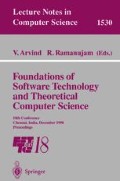Abstract
Descriptive Complexity [I98] is an approach to complexity that measures the richness of a language or sentence needed to describe a given property. There is a profound relationship between the traditional computational complexity of a problem and the descriptive complexity of the problem. In this setting, the finite object being worked on is treated as a logical structure. Thus descriptive complexity is part of finite model theory [EF95].
Access this chapter
Tax calculation will be finalised at checkout
Purchases are for personal use only
Preview
Unable to display preview. Download preview PDF.
References
Alechina, N., Immerman, N.: Efficient Fragments of Transitive Closure Logic. Manuscript
Alur, R., Henzinger, T.: Computer-Aided Verification (to appear)
Bharadwaj, R., Heitmeyer, C.: Verifying SCR Requirements Specifications using State Exploration. In: Proceedings of First ACM SIGPLAN Workshop on Automatic Analysis of Software, Paris, France, January 14 (1997)
Clarke, E., Grumberg, O., Peled, D.: Model Checking (to appear)
Ebbinghaus, H.D., Flum, J.: Finite Model Theory. Springer, Heidelberg (1995)
Emerson, E.A.: Temporal and Modal Logic. In: van Leeuwen, J. (ed.) Handbook of Theoretical Computer Science. M.I.T. Press, Cambridge (1991)
Immerman, N.: Descriptive Complexity. Springer-Verlag Graduate Texts in Computer Science, New York (1998)
Immerman, N.: Languages that capture complexity classes. SIAM Journal of Computing 16(4), 760–778 (1987)
Immerman, N., Vardi, M.: Model Checking and Transitive Closure Logic. In: Grumberg, O. (ed.) CAV 1997. LNCS, vol. 1254, pp. 291–302. Springer, Heidelberg (1997)
Immerman, N.: DSPACE[n k]=VAR[k+1]. In: Sixth IEEE Structure in Complexity Theory Symposium, pp. 334–340 (1991)
Kurshan, R.: Formal Verification in a Commercial Setting. In: Design Automation Conference (1997)
Kurshan, R.: Computer-Aided Verification of Coordinating Processes. Princeton University Press, Princeton (1994)
McMillan, K.: Symbolic Model Checking. Kluwer Academic Publishers, Dordrecht (1993)
Patnaik, S., Immerman, N.: Dyn-FO: A Parallel, Dynamic Complexity Class. J. Comput. Sys. Sci. 55(2), 199–209 (1997)
Author information
Authors and Affiliations
Editor information
Editors and Affiliations
Rights and permissions
Copyright information
© 1998 Springer-Verlag Berlin Heidelberg
About this paper
Cite this paper
Immerman, N. (1998). Descriptive Complexity and Model Checking. In: Arvind, V., Ramanujam, S. (eds) Foundations of Software Technology and Theoretical Computer Science. FSTTCS 1998. Lecture Notes in Computer Science, vol 1530. Springer, Berlin, Heidelberg. https://doi.org/10.1007/978-3-540-49382-2_1
Download citation
DOI: https://doi.org/10.1007/978-3-540-49382-2_1
Publisher Name: Springer, Berlin, Heidelberg
Print ISBN: 978-3-540-65384-4
Online ISBN: 978-3-540-49382-2
eBook Packages: Springer Book Archive

